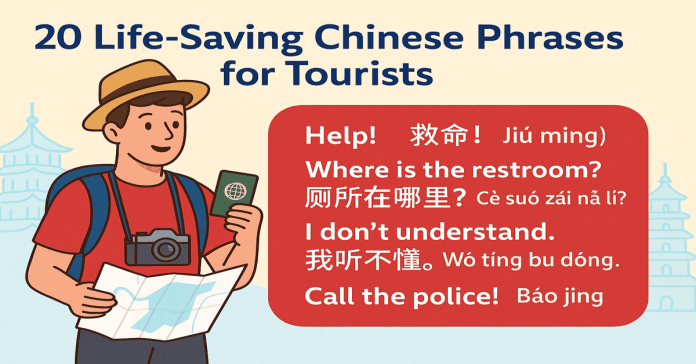If you’re planning a trip to China, learning a few life-saving Chinese phrases for tourists can make all the difference. From ordering food to asking for directions, these simple words will help non-Chinese speakers feel more confident when exploring. More importantly, some life-saving Chinese phrases for tourists cover emergencies—like calling the police, finding a hospital, or asking for help—which every traveler should know. By keeping these phrases in mind, you’ll enjoy smoother travel, connect better with locals, and feel safer on your journey.
🚨 Emergency Phrases
These are the most important to remember—keep them handy in case of trouble.
- Help!
- 救命!(Jiù mìng!)
- English: Help!
- Use in emergencies to get someone’s attention.
- Call the police!
- 报警!(Bào jǐng!)
- English: Call the police!
- Say this if you need law enforcement.
- I need a doctor.
- 我要看医生。(Wǒ yào kàn yī shēng.)
- English: I need to see a doctor.
- Where is the hospital?
- 医院在哪里?(Yī yuàn zài nǎ lǐ?)
- English: Where is the hospital?
- Call an ambulance!
- 叫救护车!(Jiào jiù hù chē!)
- English: Call an ambulance!
🚖 Transportation Phrases
Getting around in taxis, trains, or buses is much easier with these.
- Take me to this address.
- 请带我去这个地址。(Qǐng dài wǒ qù zhè gè dì zhǐ.)
- English: Please take me to this address.
- (Tip: Always carry the address written in Chinese.)
- How much is the fare?
- 多少钱?(Duō shǎo qián?)
- English: How much does it cost?
- Stop here, please.
- 请在这里停。(Qǐng zài zhè lǐ tíng.)
- English: Stop here, please.
- Which way to the subway station?
- 地铁站在哪?(Dì tiě zhàn zài nǎ?)
- English: Where is the subway station?
🍜 Food & Drink Phrases
Ordering confidently makes dining stress-free.
- I don’t eat meat.
- 我不吃肉。(Wǒ bù chī ròu.)
- English: I don’t eat meat.
- No spicy.
- 不要辣。(Bú yào là.)
- English: No spicy.
- Can I have the menu?
- 可以给我菜单吗?(Kě yǐ gěi wǒ cài dān ma?)
- English: Can I have the menu?
- One bottle of water, please.
- 请给我一瓶水。(Qǐng gěi wǒ yī píng shuǐ.)
- English: Please give me one bottle of water.
- The bill, please.
- 买单。(Mǎi dān.)
- English: The bill, please.
🛍️ Shopping Phrases
Handy when bargaining or buying souvenirs.
- Too expensive!
- 太贵了!(Tài guì le!)
- English: Too expensive!
- Can it be cheaper?
- 可以便宜一点吗?(Kě yǐ pián yí yī diǎn ma?)
- English: Can it be cheaper?
- I’ll take this one.
- 我要这个。(Wǒ yào zhè gè.)
- English: I’ll take this one.
🧭 General Travel Phrases
Everyday essentials for tourists in China.
- Where is the restroom?
- 厕所在哪里?(Cè suǒ zài nǎ lǐ?)
- English: Where is the restroom?
- I don’t understand.
- 我听不懂。(Wǒ tīng bù dǒng.)
- English: I don’t understand.
- Do you speak English?
- 你会说英语吗?(Nǐ huì shuō yīng yǔ ma?)
- English: Do you speak English?
💡 Pro Tips for Non-Chinese Speakers
- Download translation apps like Pleco or Baidu Translate (Google Translate doesn’t work well in China).
- Show addresses in Chinese when taking taxis or Didi (China’s Uber).
- Learn numbers (一, 二, 三 = 1, 2, 3)—it makes shopping and food ordering easier.
- Use WeChat—locals use it for payments and communication.
Conclusion
Traveling in China is easier and safer when you know a few life-saving Chinese phrases for tourists. From emergencies to ordering a meal, these simple words can save you stress, connect you with locals, and even help in critical situations.
👉 Before you go, check China’s public holidays and key dates—like Golden Week (October) or Chinese New Year—because trains, flights, and tourist spots get extremely crowded. Plan around these dates to avoid long queues and inflated prices.
👉 Another smart tip is to download and set up travel apps before arriving in China, since some require registration outside the country. This way, you’ll have offline maps, translation tools, and ride-hailing ready when you land.
👉 Lastly, always carry your hotel’s address written in Chinese. Even if you forget the phrases, showing the address makes it easy for taxi drivers or locals to guide you.
With these life-saving Chinese phrases for tourists and a few simple travel hacks, you’ll enjoy a smoother, safer, and more confident journey across China.




